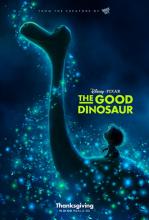The Problem with Coming of Age Narratives and The Good Dinosaur

The Good Dinosaur is a Pixar coming of age narrative featuring a dinosaur and his human pet going on an adventure. It is beautiful, cute, and a well-done coming of age narrative. However, it is extremely archetypal, and the archetype that it follows needs to change.
Here is the archetype: an immature character finds himself inadequate to face the world. He sees others in his cohort growing up, symbolized by a clear coming of age ceremony. Circumstances conspire, and he has to face his fears and grow up. That done, he can go through his coming of age ceremony, and he is a new person. Rehash that outline with slight tweaks, and you get everything from the Lion King to American Pie.
One problem with that is casting a coming of age as an event. In these stories, there is a clear disction between child and adult, with some sort of journey in between. I don't think that's a reflection of how people are growing up now. Whether the ceremoney is a Bar Mitvza or a graduation, I don't think that most people feel like a child before and an adult after. One of my professors at Stanford was focused on researching the changing american family (book, article), and one of the things he would bring up is how folks are getting married later and later. We aren't all after this clear vision of what it means to be an adult.
That idea isn't new, though. Consider the movie The Graduate. At the start of the movie, the protagonist has finished college and is having a graduation party. The movie starts with what is supposed to be a coming of age. His family and friends congratulate him on his graduation, which makes him uncomfortable. He is feeling the disconnect between everyone else's expectations of him and his own feelings. They want him to be an adult now that he has had his coming of age ceremony, but he doesn't feel like one yet. College didn't work, so he tries a superficial relationship. That doesn't work, so he tries a more committed one. Then, at the end, despite all of these experiences that are supposed to yield a coming of age, he is still uncertain.
The world of The Graduate is the one that we live in. We don't know what we're supposed to do, so we try to follow along with the stories that we hear. We find those stories inadequate, so we try to figure things out the best we can. That's why the coming of age archetype is a problem. The stories we tell are important. We're telling stories about growing up as a process that has an end. At the moment, I'm not sure if the process of growing up ends before death.
A related problem is that these stories are often value neutral. Sure, there might be some values (eg, taking responsibility in The Lion King or not being ruled by your fear in The Good Dinosaur), but they're never really defended because the right choice is usually obvious (eg, don't lie, help people when they're obviously right in your face and in need of help, word hard). There aren't enough stories where the protagonist has to struggle deciding between multiple bad or multiple good options. In the real world, there are usually multiple good options, multiple bad options, and situations where if there is one good option, it isn't obvious.
One example of this is in choosing a job after college. Some people know what they want to do, but a lot of folks struggle. Maybe their parents want them to study medicine or law, but they only sort of enjoy it. Maybe they really enjoy something but they aren't really good at it. Maybe they are considering between building skills at a finance or management consulting organization and directly helping people by working at a nonprofit. There are some coming of age stories that brush on this decision (eg, Big Hero 6 or Malcolm in the Middle), but even if a cursory treatment like those were sufficient, many stories don't even provide that much depth. It's unsurprising, then, that many people struggle with that decision or choose a default path.
Another problem with value neutral stories is moral relativism. The protagonists in these stories aren't usually directly promoting relativism (there are stories like Thank You for Smoking, where we can see the kid's coming of age in relativism, but I think that one is at least partly a critique of relativism), but by remaining silent about values, ethical philosophies, and decision making frameworks in general, relativism is what we're left with.
Now that I've critiqued The Good Dinosaur and similar stories for making a coming of age seem like a single event rather than a lifelong process as well as for being silent on values, which are a central part of coming of age, I'll talk about some good stories. In media intended for adults, it isn't hard to find meaningful coming of age stories. I Heart Huckabees, for instance, shows the protagonists going through a coming of age and learning more about their selves and the world. Name of the Wind features the protagonist telling a story about his childhood coming of age, and it's clear that he is grappling with hard decisions even as an adult. The Wizard of Earthsea portrays a coming of age as a beginning and involves conflicts with inner demons moreso than external forces.
The point of all that, though, isn't that The Good Dinosaur is bad. It's actually a fairly enjoyable movie. The point is that we, as a society, need to tell better stories to help ourselves deal with a changing world.



